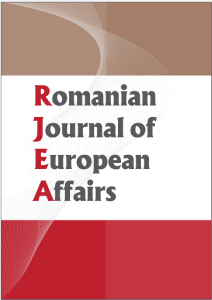Ediția de vară a Romanian Journal of European Affairs aduce în atenția cititorilor subiecte precum: o sinteză teoretică a operațiunilor politicii de securitate și apărare comună, o perspectivă comparată a misiunilor civile ale Uniunii Europene în Georgia și Kosovo, ajutoarele de urgență acordate de UE țărilor din regiunea Orientului Mijlociu și Africii de Nord (MENA), Parteneriatul Transatlantic pentru Comerț și Investiții din perspectiva provocării pe care o reprezintă pentru Uniunea Europeană, precum și o evaluare a condiționalității politice din cadrul Parteneriatului Transatlantic.
Explaining the Pattern of CSDP-Operations: Towards a Theoretical Synthesis
Tim Haesebrouck
Abstract:
The EU’s Common Security and Defence Policy (CSDP) has mainly been used to deploy small-scale operations, which generally did not provide the member states with clear security benefits. This article combines insights from different theories of international relations to explain this disappointing track record. It argues that liberal theories adequately identify the domestic pressures the member states’ governments need to accommodate in the area of crisis management. Constructivism, on its part, properly emphasises the diverging strategic cultures of the member states. Both theories however fail to explain why domestic pressures and diverging strategic cultures lead to small-scale operations. Rational-choice institutionalism does provide a convincing explanation for the latter by drawing attention to the CSDP’s ineffective institutional design. Realism, in turn, is best positioned to explain why the CSDP was not designed more effectively, by emphasising the reluctance of states to transfer sovereignty to international organisations. The article concludes by discussing two measures that could alleviate the impact of the identified impediments on the CSDP’s track record: devising a CSDP-strategy and adapting the consensus rule. However, since the latter is very unlikely in the near future, the CSDP is not expected to develop into a more effective framework for crisis management.
Keywords: Common Security and Defence Policy, liberal theories, constructivism, rational-choice institutionalism, institutional design, realism, sovereignty
Crafting a Wider Strategy for Conflict Management in the Neighbourhood? A Comparative Perspective on the European Union’s Civilian Missions in Georgia and Kosovo
Monica Oproiu
Abstract:
The European Union’s wider neighbourhood hosts some of the world’s main unresolved conflicts. As the EU developed its foreign and security policy, a blend of internal security and external stability concerns, as well as the reference to international legal and humanitarian norms, required it to try tackling (some of) these conflicts. Through both the European Neighbourhood Policy and the Stabilisation and Association Process the EU establishes contractual relations with its neighbours and tries to incentivise them for the adoption of economic and political reforms and legislative approximation to EU standards. Also, in some cases, the EU is providing support for conflict management through political dialogue, financial assistance or deployment of missions under the Common Security and Defence Policy. At its core, this paper is concerned with comparatively analysing the degree of integration between CSDP and the ENP and SAP frameworks respectively. The comparative case-study will therefore analyse CSDP missions undertaken in the Georgia/ Abkhazia and South Ossetia and Kosovo/Serbia cases, in order to identify common challenges across the two EU policy frameworks for its neighbourhood and to explore the perspectives for the emergence of an EU strategy of conflict management based on CSDP operations and various forms of engaging third countries.
Keywords: conflict management, Common Security and Defence Policy, Stabilisation and Association Process, European Neighbourhood Policy, Kosovo, Georgia
Diversity in Unity. The European Union and Member States Emergency Aid to the Countries of the Middle East and North Africa (MENA) Region
Fulvio Attinà
Abstract:
This paper draws the attention of the EU foreign policy professionals and researchers community towards the aid policy of the European Union and the major Member States towards the countries affected by humanitarian emergencies and disasters. The determinants and vertical coherence of this policy are put under observation. In particular, by measuring and comparing financial aid to the countries of the Middle East and North Africa, the MENA region, the present study assesses the importance of the aid policy vertical coherence. The analysis of the data supports the mainstream view about the common values and goals of the foreign aid policies of the Union and the Member States but warns about coherence between the Union and the state level as the European countries’ aid allocation to the MENA countries is apparently driven by different priorities.
Keywords: EU humanitarian policy, MENA region, Emergency policy, Vertical coherence
The Trans-Atlantic Trade and Investment Partnership – A Challenge for the European Union?
Oana–Antonia Colibășanu, Victor Vlad Grigorescu
Abstract:
Since the early 2000s, the United States and European Union have discussed the development of bilateral and regional trade agreements. The TTIP – Trans-Atlantic Trade and Investment Partnership was announced in February 2013 and is currently under negotiation. The initiative aims at establishing a trade agreement between the two blocs, removing all trade barriers, including the non-tariff ones, in a wide range of economic sectors. The paper looks at several key elements that the bilateral negotiations are set to challenge from the European Union perspective. We focus on the main causes for resistance within the EU towards establishing the agreement, seeking to understand the future framework for international trade for the European states. While the EU continues integration to establish a functioning internal market, still continuing the process of diminishing and eliminating non-tariff barriers among the member states, we examine whether liberalisation of trade and investment between the US and the EU will benefit the EU as a whole, considering the current socio-economic trends at the Union’s level.
Keywords: TTIP, tariff and non-tariff barriers, international negotiation mandate, international trade, FTA, EU, US, regulatory convergence, regulatory coherence, mutual recognition, equivalence, regulatory compatibility
EU and US External Policies on Human Rights and Democracy Promotion: Assessing Political Conditionality in Transatlantic Partnership
Beatriz Pérez de las Heras
Abstract:
This contribution aims at advancing existing research about the role that the Transatlantic Partnership may play within the specific field of human rights and democracy promotion in the current changing global order. It examines recent changes to the foreign policies of the European Union and the United States on this area and assesses the impact of these changes on the transatlantic partnership over the last five years. The paper argues that these modifications entail a greater convergence between the policies of the two regions, though some ideological divergences, lack of coordination and differences in implementation are still observable. However, the increasing mutual realignment could foster a truly transatlantic partnership in the field if both partners attain to define a joint strategy and establish common institutions to ensure permanent dialogue and policy coherence. At the same time, this enhanced co-operation could enable them to remain the principal supporters of human rights and democracy in the current multi-polar order.
Keywords: human rights; democracy promotion; political conditionality; transatlantic co-operation; multi-polar world






